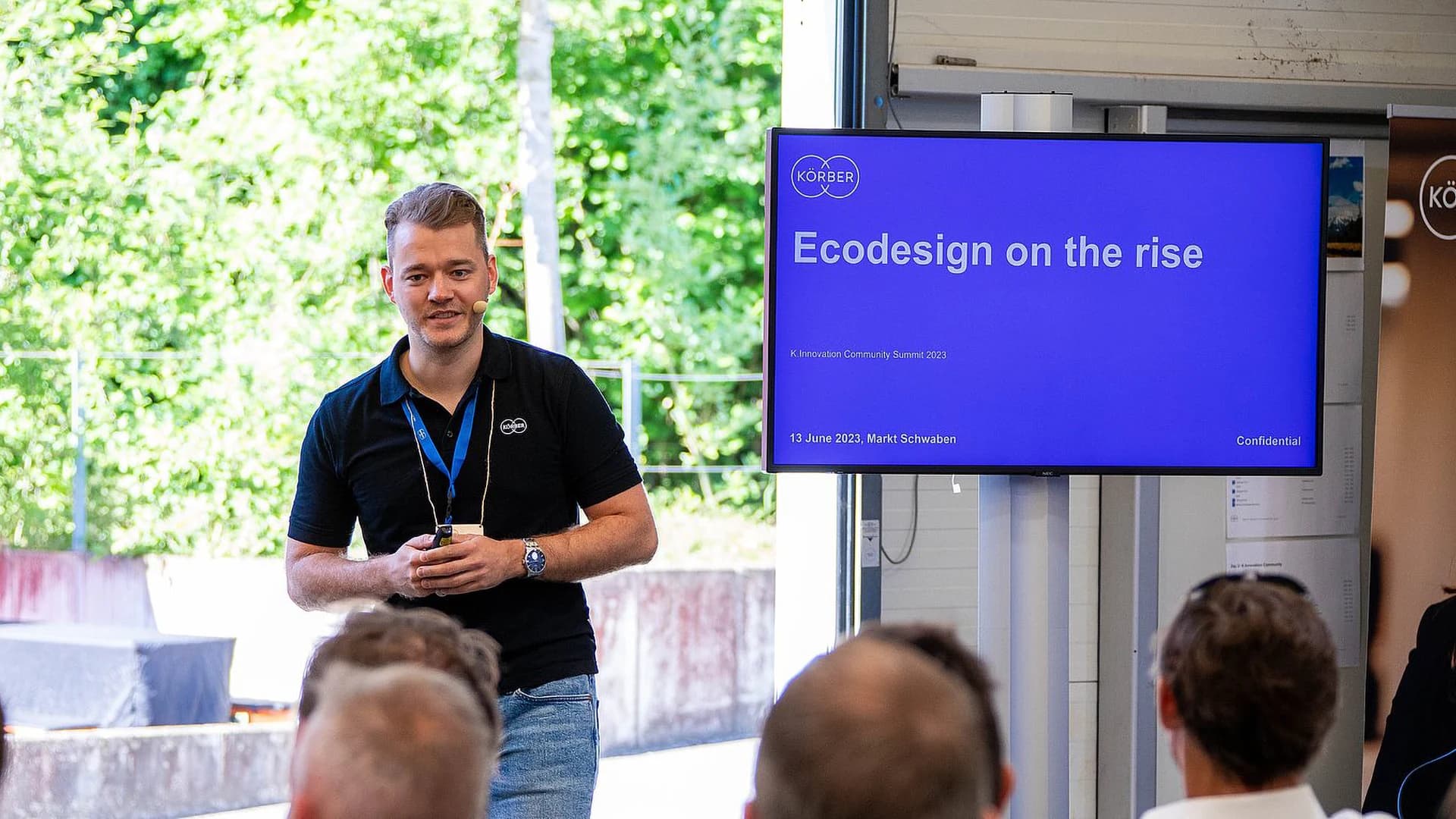- insights and events
- sustainability
- emissions korber supply chain management
Sustainability in Action: Prioritizing Scope 3.1 Emissions in Körber's Supply Chain Management

In today's world, conscious consumer behavior has driven us to rethink our approach to sustainability, not just individually but also as a company. At Körber, we share this commitment to sustainability across all facets of our operations. Our dedication extends to addressing environmental, social, and corporate governance aspects, particularly reducing carbon dioxide equivalent (CO₂e) emissions and energy consumption.
Reducing CO₂ emissions: our environmental imperative
At Körber, we began our sustainability journey by aiming for CO₂e-neutrality for our own production (Scope 1 and 2) by 2025. Now, we are taking on an even more ambitious goal – achieving net-zero emissions along our entire value chain. This involves tackling scope 1, 2, and 3 emissions without compensation, demonstrating our holistic and ambitious approach to sustainability.
As Körber Group COO/CTO Erich Hoch points out, sustainability is a subject that holds a special place in our corporate agenda: "We are passionate about developing innovations for sustainable products, solutions, and services — together with employees, customers, suppliers as well as other business partners." At Körber, we act out of conviction and see this as a key competitive advantage. "Sustainability is integral to our strategic framework, woven into the fabric of our business processes, and encompasses environmental, social, and corporate governance dimensions." To gain insights into our current progress, we encourage you to explore our Sustainability Report for the year 2022.

"We are passionate about developing innovations for sustainable products, solutions, and services — together with employees, customers, suppliers as well as other business partners."
Erich Hoch
Chief Operations Officer (COO)/ Chief Technology Officer (CTO) of the Körber Group
Scope 3.1 is key for CO₂ Reduction
As an international technology group, our primary impact on environmental sustainability is reducing CO₂e emissions. Notably, CO₂e encompasses carbon dioxide and other greenhouse gases like methane and nitrous oxide. Formulated by the United Nations' Intergovernmental Panel on Climate Change (IPCC), this measure quantifies the overall global warming potential of all greenhouse gases.
Scope 3.1 emissions are central to our strategy, encompassing emissions from producing purchased goods and services. This includes the entire supply chain journey, from the extraction of raw materials to manufacturing and transportation to our "front gate." Scope 3.1 emissions involve Tier 1 suppliers who directly provide us with materials. Integrating sustainability goals into supplier management is crucial in addressing this challenge.
Sustainable supply chains: a collaborative approach
We recognize the complexity of addressing Scope 3.1 emissions, especially when working with approximately 10,000 suppliers across 80 countries worldwide. Roughly 50% of our Group production relies on these suppliers, and nearly 40% of our CO₂e emissions in the upstream and downstream value chains are attributed to purchased goods and services beyond our direct control.
"It's a big challenge," says Marco Kretschmar, Senior Manager in Procurement & Supply Chain Management at the Körber Group. "Sustainable supply chains are no one-way street. They can only be successful if everyone works together."
Our purchasing volume is 1.3 billion euros.
Over 10,000 suppliers from 80+ countries supply Körber.
At Körber, we acknowledge that sustainable supply chains are a shared responsibility and actively engage with our suppliers through dialogues, knowledge sharing, and supplier development to measure and reduce CO₂e emissions systematically. Körber's Procurement & Supply Chain Management plays a pivotal role in this process, leveraging digital platforms to assess suppliers' sustainability practices, carbon footprint, and reduction targets, ensuring transparent control of our supply chains. "Digitization is indispensable for transparency and connectivity with our suppliers," says Kretschmar.
Taking Responsibility: CSR Assessment
We require our suppliers to regularly provide comprehensive information about their business and sustainability practices. This transparency aligns with essential requirements such as human and labor rights, anti-corruption, and anti-bribery, as mandated by the Supply Chain Act, and it also allows us to evaluate our suppliers' CO₂e footprint and reduction efforts.
Therefore, we collaborate exclusively with suppliers who undergo a CSR self-assessment and meet our stringent sustainability standards. Suppliers demonstrating exemplary sustainability practices gain a distinct competitive advantage as we prioritize them when choosing between similar-priced and quality offerings.
The Road Ahead: Regional Sourcing and CO₂e Balance
While striving to capture and manage supplier information is essential, at Körber, we acknowledge the importance of other sustainability factors. Regional sourcing will play an increasingly significant role in our future endeavors, simplifying logistics and substantially reducing our carbon footprint. "The geographical proximity of suppliers offers us the advantage that raw materials and prefabricated parts no longer have to be transported halfway around the world," says Kretschmar. Additionally, Körber focuses on assessing the CO₂e balance of purchased parts from its suppliers to collaboratively reduce emissions and enhance their products' sustainability.
The worth of sustainability
Sustainability is not just a personal endeavor; it's a collective responsibility. Companies, especially, have a pivotal role in driving sustainable practices. At Körber, we are dedicated to pioneering this endeavor, ensuring that sustainability remains a fundamental consideration in all operations. We firmly believe that our commitment to sustainability is not just a moral imperative but also a source of competitive advantage.
As companies, we are responsible for fostering sustainable practices that resonate across personal, professional, and business realms. At Körber, we remain steadfast in our commitment to sustainability, setting an example for others to follow and contributing to a more sustainable future for all.

Sustainability Report 2022
Interested in our approach? Learn more about our current sustainability initiatives in our Sustainability Report 2022.


